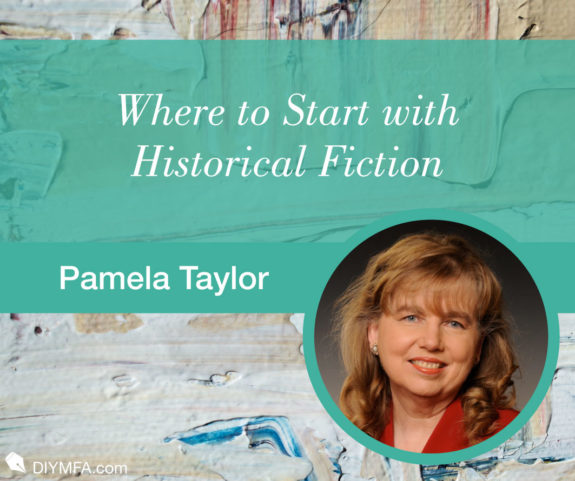Some may look at this title and wonder, “Isn’t that a topic that applies to most any author in most any genre?” And they would be correct. Yet for those of us who write historical fiction, the question of “where to start” can, at times, feel a bit daunting. After all, we have five thousand years of stories to choose from.
The question takes me back to one of the earliest articles I wrote for this column in which I explored the idea that there are six basic elements (Time, Place, Person(s), Event(s), Culture, or Legend) that are mixed in one way or another within all good Historical Fiction—and that an author may take any one of those elements as the starting place for a narrative.
That’s all well and good at a sort-of ten-thousand-foot level, but where the rubber meets the road—when you have to decide precisely what story you want to tell—how does one map concept to execution?
Start with what you love
The cliché advice to anyone wanting to write is “write what you know.” There’s nothing wrong with that advice, but, in my opinion, it doesn’t go far enough. You may know an incredible amount about the Vietnam War, but if you have a particular aversion to that period of American history, trying to write about it may quickly begin to feel like drudgery. It’s unlikely you’ll tell a very good story if you don’t enjoy what you’re writing about.
So think about what speaks to your heart. Are you intrigued by the dangers faced by the resistance movements in Europe during World War II? Find a historical figure—or create your own character—and plunge into the story.
Are you fascinated by women who’ve played remarkable roles in the distant past? These weren’t always political figures. They might have been in science or medicine or the arts. Go looking for some of the lesser-known ones and spin their tale.
Do you think it might have been fun to have lived during the Renaissance in the orbit of someone like Leonardo da Vinci or Michelangelo? Why not create a character who was an apprentice or assistant to the great master? Or, perhaps even more intriguing still, a character who fancied themselves as a rival to the great one?
Do you love music? Choose a composer—perhaps a less well-known one—and tell their story. Perhaps tell it from the point of view of someone in their household? Or maybe tell the tale of the creation of one of your favorite masterworks.
Tell the more intimate story
When you find yourself feeling like “that story’s already been told over and over,” don’t despair. Yes, maybe the story of Henry VIII and all his wives has been well hashed. But if you love that era of history, why not find—or craft—a little-known tale set against the backdrop of Henry’s quest for an heir? Henry’s break with the Church of Rome led to the dissolution of the monasteries in England. There might be quite a poignant tale in the life of a monk who lived through that purge.
Clavell created a fictional character shipwrecked in the feudal world of 1600s Japan to explore that society. And the choice of a protagonist who really had no idea what was going on around him was a tour de force of immersing the reader in a world no one had ever experienced at the time.
Cornwell and Follett are masters of setting the stories of fictional characters against the backdrop of epic periods of human history. By telling the more intimate tale of what living through an epic period of history felt like to “ordinary” people, they draw their readers into those times in a way that feels like a very personal experience.
Look to your own family
Thanks to the internet and modern genealogical research sites, it’s now far easier than it used to be to discover our ancestors and where they lived, and what they did. Maybe it’s no more than one generation back, as is the case with a release from this past summer: The Caves of San Pietro, in which the fictional narrative is based on a family story that links the 1918 Spanish Flu, the heartbreaking story of the Orphan Trains of the early 20th century, and the liberation of Italy in World War II. On the other hand, your ancestral inspiration may go back hundreds of years, as in the case of Bernard Cornwell’s Last Kingdom series.
In my own case, we think we’ve traced our family back to members of the Norman aristocracy in medieval England. One branch of the family received honors from the Crown within English territory while another branch received grants of land in the American colonies. I wonder which branch of the family might be the most fun to write about?
So, why revisit an earlier article?
First and foremost, it seemed a good topic for this column to connect some dots between concepts and the actual germ of a story. But secondly, I’ll admit to feeling a bit nostalgic as I put pen to paper (or more accurately, fingers to keyboard) for this article as it’s to be my last in this series.
It’s been a truly wonderful experience to have had the opportunity to share my thoughts with the DIY MFA community. But I’ve hogged the podium for three and a half years now, and it goes without saying that there are other novelists in our genre who have thoughts they’d love to share. They deserve their chance. And the community deserves the chance to hear a diversity of ideas—it makes us all better at what we do.
While I’m passing on the pen for this column, I’m not abandoning DIY MFA. I’ll be hanging out on Word Nerds Unite and continuing to follow the excellent content on the website, listening to podcasts, and constantly looking out for what’s new here to help me improve my craft.
Thank you, Gabriela, for the opportunity to be part of your team. And special thanks to those who’ve found reading my column worthwhile.
I’ll leave you with two parting thoughts. The first is from Hilary Mantel, which I find a wonderfully succinct summation of our genre:
And the other from Albert Einstein: “Life is like riding a bicycle. To keep your balance, you must keep moving.”
Happy writing!

An award-winning author of historical fiction and a freelance editor, Pamela Taylor loves helping others polish their stories almost as much as she enjoys writing her own. She’s a member of the DFW Writers Workshop and the Editorial Freelancers Association and spent four years on the judges’ panel for the Ink & Insights Writing Contest. She shares her home with two Welsh Corgis who frequently remind her that a dog walk is a great way to get inspiration for that next chapter.







